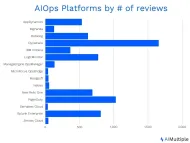In-Depth Guide to Custom Software Development in 2024
Growing businesses often face the decision of sticking with commercial off-the-shelf (COTS) software solutions or developing customized software that satisfies their specific needs better. However, embarking on a software development project can be resource-consuming, and success is not guaranteed: 75% of business and IT executives anticipate that their software projects will fail.
In this article, we will answer questions such as when businesses should develop custom software, what are its benefits and challenges compared to using an off-the-shelf solution.
What is custom software development?
Custom software (also known as tailor-made software or bespoke software) development is the process of designing, developing, and maintaining software applications to fulfill the specific needs of organizations and other users.
Custom software and applications are the opposite of mass-market software (also known as commercial off-the-shelf software or canned software) which are standardized and designed for a broad range of customers.
What are the different methods of developing custom software?
Custom software development can mean:
- Building software from scratch: Developing custom software from scratch and deploying it can be a time-consuming and costly process. Therefore, this is a plausible option especially for large companies that have the necessary resources or for businesses that cannot meet their unique needs with an off-the-shelf solution.
- Configuring an off-the-shelf solution: If an existing software satisfies your business needs except for certain issues or limitations, customizing an off-the-shelf solution can be a more cost and time-effective option. This is an approach frequently used in the implementation of ERP or CRM software with extensions or add-ons that fills functionality gaps. This method is also referred to as hybrid model.
When does a business need custom software development?
Businesses can benefit from customized software and applications if:
- Off-the-shelf solutions do not exist, or existing solutions offer limited functionality, which cannot meet their specific needs, and require significant configurations.
- They operate in an industry where compliance with privacy and security regulations is a major concern. Healthcare and finance are examples of such industries that can benefit from customized software for higher security and better compliance.
What are the benefits of custom software development?
- Efficiency: Off-the-shelf solutions often contain unnecessary extra features. It means businesses pay for tools that they will never use and need to configure the software for more efficient usage. Customized software is designed and optimized for the specific needs of an organization. Therefore, businesses get only the necessary functionality from it.
- Scalability and flexibility: Custom software can be continuously adjusted to changing business needs. Businesses can tailor the software as their organizations grow or adjust it to changing customer demands. Off-the-shelf software provides relatively limited customization options and additional features may incur additional costs.
- Better integration: Depending on the use case, it can be challenging or costly to find an off-the-shelf solution that can be well-integrated with the existing business structure. Businesses can develop custom software that seamlessly integrates with the existing software and business structure.
- Security: Exclusive ownership of software can protect businesses from external threats and reduce the odds of a security breach since a small number of users have access to it.
What are the challenges that face custom software development?
- Longer time to deploy: Depending on the complexity of the application, the custom software development process can take a significant amount of time. Businesses can encounter unforeseen problems while designing, developing, testing, and debugging the software, and the project can take longer than expected. This is a deterrent factor, especially for bigger projects.
- Higher initial and maintenance costs: Developing custom software incurs a significantly higher initial cost than purchasing or subscribing to an off-the-shelf solution. Businesses also need to spend money on the maintenance of custom software. However, development and maintenance costs can justify themselves in the long run.
In-house or outsourced custom software development?
Both creating an in-house team of developers and outsourcing custom software development have benefits and drawbacks, and the choice depends on business objectives and project requirements.
Companies with the necessary resources can build in-house teams to develop custom software for their specific needs. In-house teams are beneficial since developing custom products requires a good understanding of business needs and company culture. However, hiring and training a team of developers can be costly and time-consuming.
Outsourcing custom software development processes can enable businesses to access a huge talent pool and offer more flexibility. For instance, businesses can work with different vendors for different projects or implement a different engagement model according to the project requirements. However, outsourcing can carry security risks since businesses cannot fully control the development process.
Outsourcing software development has similar advantages and challenges with outsourcing machine learning and data labeling projects. For more, you can check our articles on ML outsourcing and data labeling outsourcing
How to assess custom software development partners?
- Domain and technical expertise: The vendor should have experience with projects relevant to your business’ industry and with the specific type of solution. They should also have expertise in relevant software development technologies.
- References: The vendor should be able to provide case studies from previous projects. Contacting companies that worked with the vendor can be a good source of information.
- Team: You can also check individual team members’ backgrounds. Knowledge of a diverse set of software development tools and technologies can be a sign of high-quality work.
- Support and maintenance model: If software performance degrades or additional configurations are required, the vendor should be available for support.
You can also check our article on low/no code software development.
If you still have questions about custom software development, we would like to answer them:

Cem has been the principal analyst at AIMultiple since 2017. AIMultiple informs hundreds of thousands of businesses (as per similarWeb) including 60% of Fortune 500 every month.
Cem's work has been cited by leading global publications including Business Insider, Forbes, Washington Post, global firms like Deloitte, HPE, NGOs like World Economic Forum and supranational organizations like European Commission. You can see more reputable companies and media that referenced AIMultiple.
Throughout his career, Cem served as a tech consultant, tech buyer and tech entrepreneur. He advised businesses on their enterprise software, automation, cloud, AI / ML and other technology related decisions at McKinsey & Company and Altman Solon for more than a decade. He also published a McKinsey report on digitalization.
He led technology strategy and procurement of a telco while reporting to the CEO. He has also led commercial growth of deep tech company Hypatos that reached a 7 digit annual recurring revenue and a 9 digit valuation from 0 within 2 years. Cem's work in Hypatos was covered by leading technology publications like TechCrunch and Business Insider.
Cem regularly speaks at international technology conferences. He graduated from Bogazici University as a computer engineer and holds an MBA from Columbia Business School.
To stay up-to-date on B2B tech & accelerate your enterprise:
Follow on

Comments
Your email address will not be published. All fields are required.